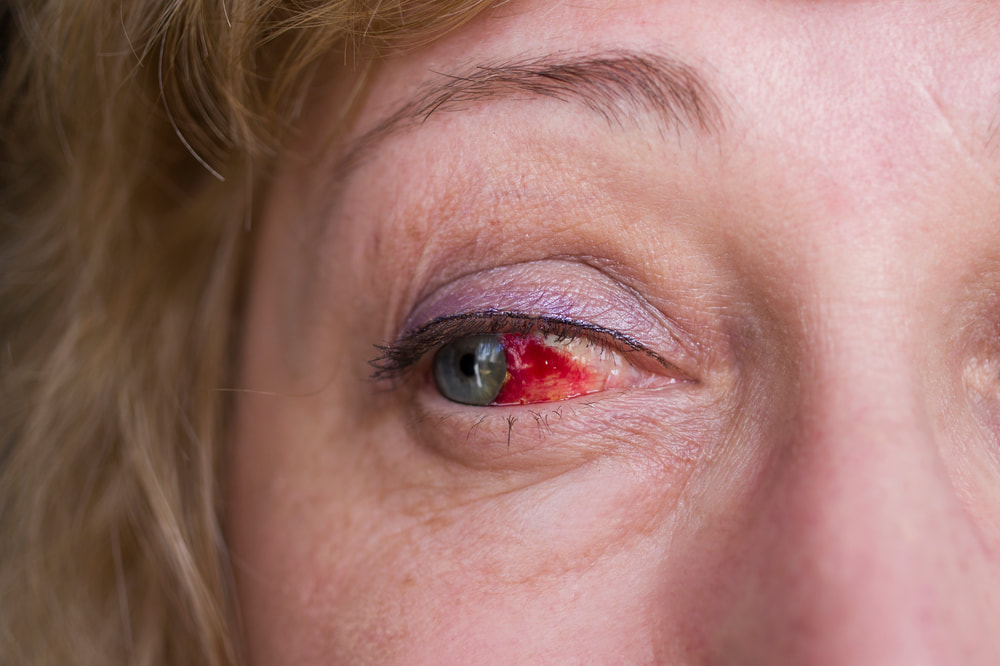other reasons. October is Eye Injury Prevention Month, and it is an excellent time to learn what causes this common injury and how to prevent it. What is a Subconjunctival Hemorrhage?The conjunctiva is the membrane that covers the white part of the eye. It has many fragile, small blood vessels, which can break easily. A hemorrhage involves bleeding. A subconjunctival hemorrhage is bleeding on the white surface of the eye. When the small blood vessels break, the blood leaks into the white part of the eye. Subconjunctival hemorrhages are usually painless and don’t involve inflammation or discharge from the eye. They also do not interfere with vision. Typically, the only symptom is blood on the conjunctiva. Some people may feel a slight irritation as if something was in their eye. A subconjunctival hemorrhage can involve one or more tiny dots of blood, or it can cover the entire white part of the eye. Causes of a Subconjunctival HemorrhageAccording to the American Academy of Ophthalmology, a subconjunctival hemorrhage can have several different causes, including the following: Trauma: Injuries to the eye can cause the blood vessels to rupture and lead to bleeding in the conjunctiva. Various types of injuries to the globe of the eye or the orbital bone can cause a hemorrhage. Even a minor trauma, such as rubbing the eye too hard, can cause the blood vessels to break. Coughing and sneezing: Something as simple as coughing or sneezing may also lead to a subconjunctival hemorrhage. What happens is the transient increase in blood pressure in the veins during a sneeze or cough causes the vessels to break. Straining: Straining too hard also increases the pressure in the veins, which can lead to a burst vessel. For instance, straining due to constipation or when lifting something heavy may lead to a subconjunctival hemorrhage. Medication side effects: Certain types of medication, such as blood thinners, can increase your risk of developing a subconjunctival hemorrhage. Examples of blood thinners include warfarin and heparin. Some over the counter anti-inflammatory drugs, such as ibuprofen can also thin the blood. There are other less common causes of subconjunctival hemorrhages, including blood clotting disorders and rare diseases, such as ocular amyloidosis. Although anyone can develop a subconjunctival hemorrhage, there are certain factors that increase your risk. For example, people that have diabetes or high blood pressure are at an increased risk of developing a subconjunctival hemorrhage. Wearing contact lenses and having arteriosclerosis also increases your risk. Subconjunctival Hemorrhage TreatmentIn most cases, a subconjunctival hemorrhage does not require treatment. The blood is absorbed by the body, and the redness typically clears in a week or two. If a mild irritation is present, over the counter eye drops may help. PreventionPreventing a subconjunctival hemorrhage is not entirely possible since the cause is not always known. But there are a few things you can do to decrease your risk.
When to See a DoctorAlthough medical treatment is usually not needed for a subconjunctival hemorrhage, there are times when it is important to see a doctor, such as in the following instances:
If you have any questions about a subconjunctival hemorrhage or you want to schedule an exam with one of our eye doctors, please phone us at 508-746-8600. Comments are closed.
|
EYE HEALTH BLOGCategories
All
Archives
July 2024
|
|
Kadrmas Eye Care New England
55 Commerce Way, Plymouth, MA 02360
14 Tobey Road, Wareham, MA 02571 133 Falmouth Road (Rt 28), Mashpee, MA 02649 |
Phone Number:
1-508-746-8600 Hours: Monday through Friday — 8 AM – 4:30 PM |


 RSS Feed
RSS Feed
